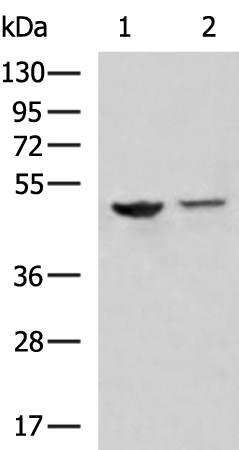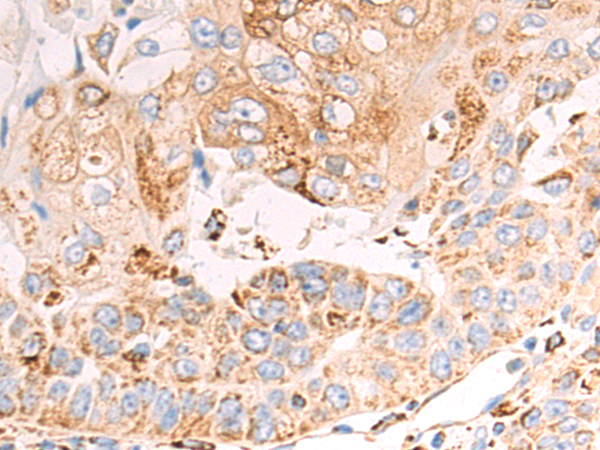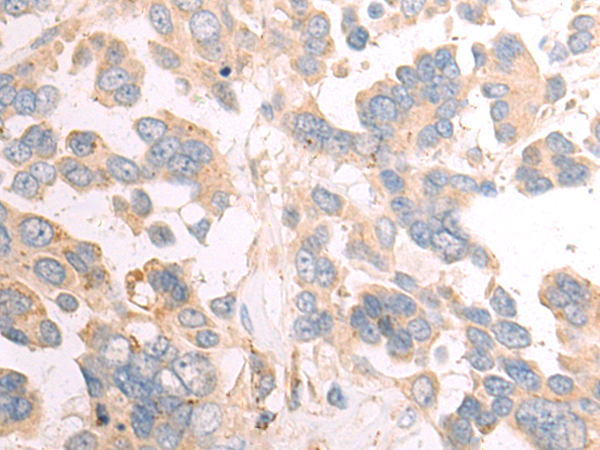


| WB | 咨询技术 | Human,Mouse,Rat |
| IF | 咨询技术 | Human,Mouse,Rat |
| IHC | 1/50-1/200 | Human,Mouse,Rat |
| ICC | 技术咨询 | Human,Mouse,Rat |
| FCM | 咨询技术 | Human,Mouse,Rat |
| Elisa | 1/5000-1/10000 | Human,Mouse,Rat |
| Aliases | SQR; SQRDL; CGI-44; PRO1975 |
| WB Predicted band size | 50 kDa |
| Host/Isotype | Rabbit IgG |
| Antibody Type | Primary antibody |
| Storage | Store at 4°C short term. Aliquot and store at -20°C long term. Avoid freeze/thaw cycles. |
| Species Reactivity | Human, Mouse |
| Immunogen | Fusion protein of human SQOR |
| Formulation | Purified antibody in PBS with 0.05% sodium azide and 50% glycerol. |
+ +
以下是关于SQOR(硫醌氧化还原酶)抗体的3篇参考文献示例(注:部分信息为示例性概括,实际文献需根据具体数据库检索确认):
---
1. **文献名称**:*"Sulfide Quinone Oxidoreductase (SQOR) in Mitochondrial Sulfide Metabolism: Localization and Functional Characterization"*
**作者**:Bouillaud, F., et al.
**摘要**:该研究通过免疫印迹(Western blot)和免疫荧光技术,使用特异性SQOR抗体验证了SQOR蛋白在线粒体中的定位,证明其催化硫化氢(H₂S)转化为硫代硫酸盐的关键作用,并揭示了其在抗氧化防御中的生理意义。
2. **文献名称**:*"SQOR Deficiency Alters Cellular Redox Homeostasis via Disrupted Hydrogen Sulfide Oxidation"*
**作者**:Libiad, M., et al.
**摘要**:作者利用SQOR基因敲除模型及特异性抗体检测,发现SQOR缺失导致细胞内硫化氢积累,引发氧化应激和线粒体功能障碍,强调了SQOR在维持硫代谢平衡中的必要性。
3. **文献名称**:*"Tissue-Specific Expression of Sulfide Quinone Oxidoreductase: Insights from Immunohistochemical Analysis"*
**作者**:Yadav, P.K., et al.
**摘要**:通过多克隆SQOR抗体对多种哺乳动物组织进行免疫组化分析,揭示了SQOR在肝脏、肾脏等高代谢组织中的高表达模式,提示其与器官特异性硫解毒途径的关联。
---
如需具体文献,建议通过PubMed或Google Scholar检索关键词“SQOR antibody”或“sulfide quinone oxidoreductase immunohistochemistry”获取最新研究。
SQOR (sulfide:quinone oxidoreductase) is a mitochondrial enzyme central to hydrogen sulfide (H₂S) metabolism, catalyzing the oxidation of sulfide to sulfite while transferring electrons to the mitochondrial quinone pool. This process is critical for maintaining cellular redox balance and mitigating sulfide toxicity. Dysregulation of SQOR activity has been linked to various pathological conditions, including metabolic disorders, neurodegenerative diseases, and ischemia-reperfusion injury, due to its role in modulating H₂S signaling—a gasotransmitter involved in cytoprotection, inflammation, and energy metabolism.
SQOR antibodies are essential tools for studying the enzyme’s expression, localization, and function. They are typically generated by immunizing animals with recombinant SQOR protein or peptide epitopes, yielding polyclonal or monoclonal variants. These antibodies enable techniques like Western blotting, immunohistochemistry, and immunofluorescence to quantify SQOR levels in tissues or cells, assess its subcellular distribution, and explore its interaction partners. Recent research has highlighted SQOR’s potential as a therapeutic target, particularly in diseases associated with oxidative stress or mitochondrial dysfunction. For instance, SQOR upregulation has been observed in certain cancers as an adaptive survival mechanism, while its downregulation correlates with neurodegenerative pathology. Validated SQOR antibodies thus support both basic research and drug development efforts aimed at modulating H₂S-related pathways.
×